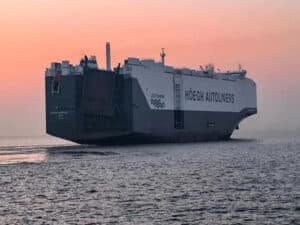
Op-Ed: The talk of 2022 becomes the reality of 2023
Written by Heather Ervin
Fabian Feldhaus
By Fabian Feldhaus, Co-Founder & Managing Director of Flagship Founders
Fabian Feldhaus is managing director & co-founder of Hamburg, Germany-based Flagship Founders GmbH, whose team of entrepreneurs, investors and shipping experts supports ambitious founding teams in building agile and scalable solutions for the global maritime market.
Following an eventful 2022, this year already promises to be a challenging one. Freight rates have dropped back to 2019 levels and uncertainty lingers about the recovery of global demand. If the glut of ships ordered in recent years enters fleets and trade volumes remain low, it’s hard to see the ingredients for a dramatic recovery in rates any time soon.
Meanwhile, our sector faces significant regulatory challenges and operational changes. I want to highlight the role that digital technologies will play in navigating these challenges, potentially turning them into opportunities. Finding efficiencies and investing in tools to make operations leaner (and greener) will be a defining trend in the coming year.
Environmental regulations: Reality bites!
Decarbonization was the most discussed topic in the shipping industry in 2022. This year the enforcement of the much-discussed Carbon Intensity Indicator (CII) regulations begins. The time for the “strategic patience” tactic has lapsed. New digital solutions came on to the market last year to help us make optimal choices to protect businesses, and our planet. Startups like zero44, deepsea.ai or Everimpact are offering innovative solutions to help companies get to grips with their CO2 liabilities.
In 2023 I expect to see reality biting for those who did not prepare for the changes, and accordingly we will see these digital solutions implemented with renewed urgency as financial implications of regulations loom. Digital solution providers navigating their clients through the CII challenge will also now be thinking how to augment their offering and capitalize on the opportunity presented by the entry of our sector to the European Emissions Trading Scheme.
Green Corridors & Alternative Fuels
There was also much talk around so-called “Green Corridors” in 2022, evidenced by the Clydebank Declaration at COP26 and the report “The Next Wave: Green Corridors” from the Getting to Zero Coalition. To turn this into a long-term reality, new hardware and alternative fuels will play a key role. The year 2023 has already seen the commitment of key players in this direction, namely Maersk with their recent investment in Berlin-based startup Carbon One.
While this year the fuel transition will pick up pace, it will remain a long-term priority. In the near term, the use of digital technologies to improve the efficiency and deepen the green hue of trade corridors will make the difference. Watch for the increased use of artificial intelligence to optimize shipping routes and improve fuel efficiency.
A new digital era for ship inspections
Environmental initiatives and regulations were not only the catalysts for discussion last year. Twenty-nine years after the Oil Companies International Marine Forum (OCIMF) launched the Ship Inspection Report Programme (SIRE) to ensure a united front on high standards and expectations, SIRE 2.0 was finally announced in 2022.
In June 2023 these changes go live. The old, familiar questionnaire gives way to a new form produced differently for every inspection. It will also mark a dramatic cultural shift towards the digitalization of such inspections, as inspectors will now carry special tablet devices, and the digital data recording will ensure higher and more stringent inspection standards.
The new changes and increased complexity mean operators that navigate this successfully will be those who invested in pre-vetting inspections, onboard maintenance and training as well a digital-first approach to match the rigorous data-collections standards of the new digital inspection regime.
Digitalization: Economic headwinds mean now is the time to act
As an array of complex challenges emerge, and digital tools are developed to address them, these digital technologies in turn create a wealth of new data for companies that can be used to further inform and hone decision-making. Last year also saw the launch and funding of numerous new digital and data initiatives across the industry. On the other hand, 2022 also saw some digital projects sadly not realize their full potential, with Tradelens being one unfortunate example.
Whether adjusting to increased pressures on emissions, heightened operational standards, or weathering challenging economic times, in 2023 digital tools will be essential to shipping companies wishing to survive and thrive. But digital tools and vast amounts of data alone are clearly not a panacea. I believe 2023 will also see industry players get smarter about the use cases for, and implementation of digital tools, and about the best ways to use and share the data they create. I therefore expect the same carefully honed intuition and human decision-making that has served this industry well for generations to be the key factor in making digitalization a valuable course of action that will see our industry through rough waters in 2023, rather than a source of just more talk.




